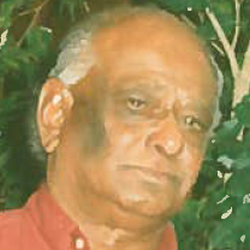DOCTOR OF PHILOSOPHY (HONORIS CAUSA) (POSTHUMOUS)
 Dr Masilamoney (Masla) Pather was born in Durban on 4 August 1921. He was the eldest of seven children, attended the Hindu Tamil School and completed his secondary education at Sastri College in Durban.
Dr Masilamoney (Masla) Pather was born in Durban on 4 August 1921. He was the eldest of seven children, attended the Hindu Tamil School and completed his secondary education at Sastri College in Durban.
He then enrolled at the University of Fort Hare for the pre-medical course, a prerequisite for Medical Studies at Witwatersrand University (Wits) at that time. His contemporaries at Fort Hare included Nelson Mandela and Joseph Njongwe.
Since residence on campus at Wits University was denied to black students, Masla was able to obtain accommodation in Vrededorp, an area with people living in abject poverty and dilapidated homes. He joined the Communist Party of South Africa (CP) in 1942 and formed a branch in Vrededorp.
Dr Pather completed his medical degree and after his internship at Lovedale Hospital he returned to Durban in 1947 amidst the Passive Resistance Campaign against the Bantu Urban Constitution Act of 1945, the forerunner of the Group Areas Act, the Black Land Act and the laws demanding the carrying of a dompas, to name a few. When he settled in Cape Town he became involved in the Coloured People’s Congress and the CP underground movement. On 7 October 1950 he married Mavis Naidoo, who was a well-known activist in her own right.
In 1954, he joined Livingstone Hospital in Port Elizabeth as a medical officer. At the time, the Group Areas Act had not been fully implemented and the residential area of South End was still home to many people who lived below the poverty line. Dr Pather lamented the fact that the far better-equipped Provincial Hospital was much nearer to South End. Yet, poor people had to travel to Korsten to access hospital facilities. The building housing Dr Pather’s “clinic” was destroyed during the forced removals from South End. When South End and Fairview lay fallow as a result of forced removals of people, he relocated to Highfield Road, Korsten.
Dr Pather was arrested in October 1963, charged inter alia with contravening the Suppression of Communism Act and was excommunicated to Robben Island to serve his sentence. The time he gained from being spared physical labour was spent teaching the “youngsters” on Robben Island to speak English and to explain the broader non-racial landscape that the struggle against apartheid represented.
After his conviction, his approach to medicine - in particular his practice which had become a medical hive upon which the poor relied - attracted international attention and even the eye of Martin Luther King Jr who said that the world needed more of his kind. Since then, a number of similar clinics which essentially serve poor people where government obligations fall short have been established in countries such as Brazil, Jamaica and Mozambique. After serving his full prison sentence, Dr Pather was released and restricted to the magisterial district of Durban. He eventually set up a clinic to serve the poor in that area. KwaDabeka Community Clinic is now a government entity, one of the busiest clinics in the country. He died on 4 June 2001 after suffering a stroke.
For his selfless work for social justice and for ensuring that the poorest of the poor experienced the dignity of access to professional health care services, it is an honour for Nelson Mandela Metropolitan University to confer the degree of Doctor of Philosophy (honoris causa) (posthumous) on Masilamoney Pather.